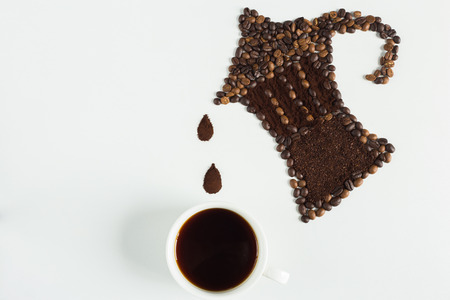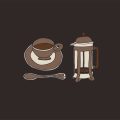Introduction to Reusable Coffee Cups in the UK
The British coffee scene has undergone a remarkable transformation over the past decade, with reusable coffee cups swiftly becoming a staple for eco-conscious consumers. From bustling London high streets to independent cafés in Manchester and Edinburgh, the sight of commuters and students clutching their own stylish reusable cups is now commonplace. This shift is not merely a fleeting trend but a significant cultural movement, fuelled by an increased awareness of environmental issues and the pressing need to reduce single-use plastics. British coffee aficionados are embracing sustainability as a core value, recognising the impact that everyday choices—such as opting for a reusable cup—can have on the planet. As government initiatives and local councils intensify efforts to curb waste, and major coffee chains introduce incentives for bringing your own cup, the demand for high-quality, durable, and stylish reusable coffee cups has surged across the UK. In this context, it becomes essential to explore which brands are leading the way in both design and sustainable practices, setting new benchmarks for responsible coffee consumption.
Key Sustainability Criteria for Reusable Cups
When evaluating the leading reusable coffee cup brands in the UK, it is essential to establish a robust set of sustainability criteria. These benchmarks not only determine a product’s environmental footprint but also empower consumers to make more informed, eco-conscious choices. Below, we break down the key eco-credentials and metrics used to assess each brand’s impact:
Material Composition
The type of material used in manufacturing reusable cups directly influences their sustainability credentials. Common options include stainless steel, tempered glass, bamboo fibre, recycled plastics, and bioplastics. Each material presents unique strengths and weaknesses regarding durability, recyclability, and resource intensity.
| Material | Durability | Recyclability | Origin of Raw Material |
|---|---|---|---|
| Stainless Steel | High | Widely Recyclable | Often Virgin or Recycled Steel (global) |
| Bamboo Fibre | Medium | Compostable (if pure) | Sustainably Harvested (Asia/UK imports) |
| Tempered Glass | High | Fully Recyclable | Mainly European Sources |
| Recycled Plastic (rPET/PP) | Medium-High | Varies (usually recyclable) | Diversified (UK and global waste streams) |
| Bioplastic (PLA/CPLA) | Medium | Industrial Composting Only | Mainly from Plant-Based Sources |
End-of-Life Options
An often overlooked yet critical factor is what happens when a reusable cup reaches the end of its useful life. Brands that offer take-back schemes or design for easy disassembly score higher on sustainability. The availability of recycling or composting facilities in the UK also impacts real-world outcomes.
| Cup Type/Brand Feature | Disposal Route in UK | Sustainable Outcome? |
|---|---|---|
| Fully Recyclable Stainless Steel/Glass Cups | Curbside Recycling Facilities | Yes, where infrastructure exists |
| Bamboo Fibre Cups with Melamine Resin | General Waste (non-compostable due to resin) | No – landfill/incineration likely |
| Pure Bamboo or PLA Cups* | Industrial Composting Only* | Conditional on facility access* |
| Circular Take-back Schemes (e.g., company returns) | Brand-managed recycling/upcycling programmes | Yes – closed-loop systems preferred in UK context |
*Note: Most UK councils do not accept bioplastics or compostables in food/garden waste bins; specialist facilities required.
Manufacturing Origins & Supply Chain Transparency
The geographical origin of manufacturing plays a pivotal role in carbon emissions due to transport and energy sources. British-made cups generally have a lower transportation footprint and greater supply chain transparency, while imported products may lack traceability regarding labour practices and raw material sourcing. Leading UK brands increasingly publish detailed impact reports and traceability data to assure customers of ethical standards.
Sustainability Assessment at a Glance:
| Criterion | Sustainability Impact |
|---|---|
| Sourced Materials (UK/EU vs Imports) | Lower emissions & greater oversight with local sourcing |
| Circular Design Features (Repairs/Returns) | Keeps cups out of landfill, maximises reuse potential |
| Ecolabels & Certifications (e.g., B Corp, FSC) | Adds credibility to environmental claims |
The Bottom Line:
A truly sustainable reusable coffee cup brand must excel across multiple benchmarks: responsible material selection, clear end-of-life solutions tailored to the UK waste system, minimal transport miles, and transparent manufacturing practices. These criteria form the backbone for our comparative analysis of Britain’s top reusable coffee cup brands in the sections that follow.

3. Spotlight on Leading UK Brands
The United Kingdom has become a hub for innovative and environmentally-conscious reusable coffee cup brands, each offering distinct approaches shaped by local culture and British ingenuity. Let’s profile some of the top UK-based players in this space, ranging from household names to up-and-coming favourites, all of which reflect the nations commitment to sustainability and a quintessentially British sense of style.
KeepCup UK
Although originally hailing from Australia, KeepCup has established a strong presence across the UK. Its cups are renowned for their barista-standard sizing and customisable designs, making them a popular choice among British commuters who appreciate both function and flair. The brand’s commitment to using toughened glass and BPA-free materials speaks to its eco credentials, while its partnerships with local cafés underscore its dedication to supporting the British coffee scene.
rCUP (Now Circular&Co.)
Proudly designed and manufactured in Cornwall, rCUP—now known as Circular&Co.—represents a pioneering leap in sustainable product design. As the world’s first reusable coffee cup made from recycled paper cups, it exemplifies closed-loop innovation. Circular&Co.s products are celebrated for their 360-degree drinking experience and leakproof construction, addressing the practical needs of busy Britons while championing circular economy principles.
Chilly’s
Chilly’s has become synonymous with stylish sustainability in the UK. While best known for its water bottles, the brand’s reusable coffee cups have swiftly gained popularity thanks to their sleek aesthetic and excellent thermal insulation. Chilly’s often collaborates with local artists for limited edition designs, giving its products a distinctly British creative edge that appeals to trend-conscious consumers seeking individuality alongside environmental responsibility.
Huskup
An emerging favourite among eco-savvy Brits, Huskup crafts its reusable cups from rice husk—a natural byproduct that would otherwise go to waste. Based in Somerset, Huskup brings together traditional craftsmanship and modern eco-awareness. Its earthy tones and minimalist designs offer a subtle nod to rural British heritage while delivering robust performance for daily use.
Ecoffee Cup
Ecoffee Cup stands out with its vibrant patterns inspired by British art and culture. Made primarily from bamboo fibre, these lightweight yet durable cups have gained traction in urban centres like London and Manchester. Ecoffee Cup frequently partners with British charities to promote environmental causes, further rooting itself within the community spirit so valued in the UK.
Together, these brands showcase how British businesses are not only responding to global calls for sustainability but also infusing their products with unique local character—blending technical innovation with cultural authenticity to shape the future of coffee consumption in the UK.
4. Materials and Manufacturing Practices
When it comes to reusable coffee cups, the sustainability credentials of each brand are deeply influenced by their choice of materials and manufacturing methods. UK consumers are becoming increasingly discerning, prioritising not only eco-friendly materials but also ethical production standards. Below is an in-depth comparison of the most prominent brands, focusing on their material selection—such as bamboo fibre, stainless steel, and recycled plastic—and the manufacturing practices that underpin their commitment to sustainability.
Overview of Materials Used
| Brand | Main Material(s) | Sustainability Credentials | Recyclability |
|---|---|---|---|
| KeepCup | Tempered glass, BPA-free plastic, cork | BPA-free; glass is inert and durable; cork is upcycled from wine industry waste | Glass and cork recyclable (where facilities exist); plastic parts can be recycled through specialist schemes |
| Chilly’s | Stainless steel (18/8 food grade) | Highly durable; stainless steel is widely recycled in the UK; no plastic lining | Fully recyclable at end of life in metal recycling streams |
| Ecoffee Cup | Bamboo fibre, corn starch, resin | Bamboo is a fast-growing renewable resource; free from melamine; non-toxic dyes used | Bamboo composite not recyclable via standard council collections but compostable under industrial conditions |
| rCUP (Circular & Co.) | Recycled single-use paper cups, polypropylene lid | Pioneering circular economy model by using post-consumer waste; promotes closed-loop recycling | Main body recyclable via specialist schemes; lid can be recycled with plastics |
| Frank Green | Tritan™ copolyester, stainless steel options available | BPA-free; Tritan™ is highly durable and lightweight; manufactured to reduce waste | Tritan™ currently not widely recycled in UK kerbside but accepted by some specialist schemes; stainless steel fully recyclable |
| Cupffee UK | Biscuit-based edible cup (wheat, oat bran) | Completely compostable and edible; eliminates waste entirely if consumed after use | No recycling needed—edible or compostable as food waste |
Manufacturing Standards and Ethical Practices
The top UK brands go beyond material selection by ensuring their manufacturing processes adhere to stringent environmental and social standards. Chilly’s and KeepCup both prioritise factories with ISO 14001 environmental management accreditation. Ecoffee Cup ensures its bamboo sourcing is certified, avoiding deforestation or exploitation. rCUP stands out for its localised supply chain—minimising transport emissions by manufacturing within Europe.
Key Manufacturing Credentials:
- ISO Certifications: Many brands partner with ISO-certified factories to guarantee responsible energy use and reduced waste.
- Fair Labour Practices: Brands such as KeepCup publish annual transparency reports detailing worker conditions and third-party audits.
- Circular Economy Commitment: Circular & Co. (rCUP) spearheads the closed-loop approach—turning used cups into new products domestically.
- Toxin-Free Processing: Leading brands avoid harmful chemicals like BPA and melamine throughout production.
Sustainability Takeaway for UK Consumers:
If your goal is to minimise environmental impact without compromising on quality or ethics, understanding both the materials used and the manufacturing standards upheld by each brand is crucial. Whether you’re drawn to the high durability of stainless steel, the renewable nature of bamboo fibre, or innovative solutions like edible cups, today’s best UK reusable coffee cup brands offer a diverse array of options rooted in genuine sustainability.
5. Sustainability in Everyday Life
When assessing the UK’s top reusable coffee cup brands, it is essential to examine how seamlessly each product integrates into the everyday routines of British consumers. Practicality is a key consideration: brands such as KeepCup and rCUP are noted for their leak-proof lids and lightweight designs, making them ideal for busy commuters navigating the London Underground or cycling through city streets. Durability is equally crucial; for instance, Chilly’s and Frank Green cups are crafted from robust stainless steel, ensuring longevity even with daily use, whether you’re grabbing a flat white from an independent café or filling up at home before the school run.
Lifestyle compatibility further sets these brands apart. Ecoffee Cup’s range of sizes and bold designs cater to those who appreciate personal expression alongside sustainability, while Stojo’s collapsible models offer unmatched convenience for space-conscious users—perfect for tucking into a backpack or handbag after use. Moreover, many UK consumers value local production and ethical sourcing; brands like Circular&Co. emphasise their closed-loop manufacturing processes and British-made credentials, resonating with shoppers who prioritise supporting local industry as well as environmental impact.
Ultimately, the top reusable coffee cup brands in the UK excel not just in eco-friendly materials but in delivering products that align with the rhythms of modern British life. Whether you’re a student dashing between lectures, a parent on the school run, or a professional working remotely from coffee shops, there is a sustainable cup designed to fit your needs without compromising on convenience or style.
6. End-of-Life Solutions and Circularity
When evaluating the sustainability of the UK’s leading reusable coffee cup brands, it’s crucial to scrutinise their end-of-life solutions and the circularity inherent in their business models. Not all cups are created equal when it comes to what happens after years of loyal service; some brands have made impressive strides in closing the loop, while others still rely on conventional disposal methods.
Circularity Initiatives Among Top Brands
KeepCup
KeepCup encourages users to return damaged or worn-out parts through its take-back scheme, ensuring components are recycled locally wherever possible. Their commitment extends beyond mere recycling—they actively partner with recycling specialists across the UK to reprocess materials into new products, exemplifying a genuinely circular approach.
rCUP (now Circular&Co.)
Circular&Co. stands out for its innovative upcycling model: old cups are returned, deconstructed, and reincorporated into new products. This closed-loop system is central to their ethos, with a strong focus on transforming waste into resource—right here in Britain.
Huskee
Huskee runs the HuskeeSwap programme at participating cafés nationwide, allowing users to exchange worn cups for refurbished ones. Collected items are broken down and repurposed into new HuskeeCups or other functional products, minimising landfill contributions and supporting a regenerative cycle.
Assessment of Disposal & Repurposing Programmes
The best brands offer more than just a bin at end-of-life—they provide clear guidance, collection points, and sometimes even incentives for returns. While some manufacturers still leave responsibility with local councils or consumers, leaders like Circular&Co. and Huskee have established visible pathways for cup recovery and material reuse.
Business Model Circularity: A Critical View
A truly circular business model prioritises design for disassembly, localised recycling partnerships, and transparent reporting on recovery rates. Brands embracing these principles not only reduce environmental impact but also foster consumer trust. However, gaps remain industry-wide; standardisation of take-back schemes and increased investment in UK-based recycling infrastructure will be key to driving progress.
Ultimately, the most sustainable reusable coffee cup brands are those that view each product as part of a larger material journey—designing for longevity, planning for responsible disposal, and reinvesting recovered resources into future production cycles.
7. Conclusion: Choosing Your Ideal Sustainable Coffee Cup
After a thorough examination of the UK’s top reusable coffee cup brands, it’s clear that each offers its own unique blend of sustainability credentials, design features, and practical benefits. From the cutting-edge material science behind rCUP and Circular&Co., to the natural minimalism of HuskeeCup, and the locally-inspired craftsmanship found in Ecoffee Cup and KeepCup, there’s a reusable cup to suit every Briton’s lifestyle and ethical priorities.
When weighing up which brand aligns best with your values, consider the key elements we’ve unpacked: material sourcing and end-of-life recyclability, carbon footprint during production and transport, durability versus replaceability, and compatibility with your daily routine—whether that’s commuting on the Tube or enjoying a leisurely stroll through your local park.
If reducing single-use waste is paramount for you, opt for cups made from recycled materials or those designed for circularity at end-of-life. For those who value supporting local enterprise, prioritise brands that manufacture within the UK or Europe. And if coffee flavour is non-negotiable, choose models with high-quality seals and inert linings to preserve your brew’s integrity.
Ultimately, the best reusable coffee cup is one that you’ll use consistently—a vessel that fits comfortably in your hand, integrates seamlessly into your routine, and reflects your commitment to a more sustainable future. By making an informed decision based on both sustainability metrics and personal convenience, you can enjoy every sip knowing you’re contributing to a greener Britain—one cup at a time.


